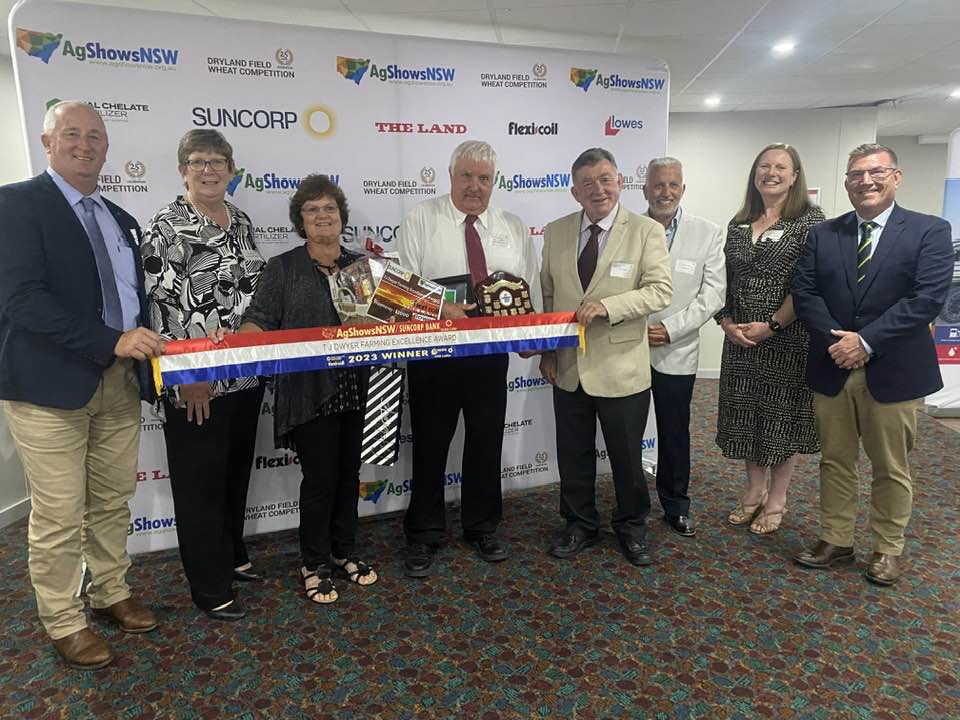
The Mickans of Walla Walla in the southern Riverina have been recognised for their commitment to excellence in farming. Photo: AgShows NSW.
Out Walla Walla way there’s a schmick little farming operation where one farmer has two wives, with one knowing full well her rival is a truck.
Robyn Mickan says her husband Garry spends so much time in that truck he may as well be married to it, but that’s OK because she has work of her own administering the family business in the office. Or the sheep yards. Or wherever she is needed.
The Mickan family has been farming for so long in the southern Riverina their roots run as deep as some of the trees but their commitment to excellence has been noted after taking out the TJ Dwyer Farming Excellence Award at the recent AgShows NSW 2024 Dryland Field Wheat Competition presentation night in Dubbo.
Operating their property “Springfield” as Mickan Bros, they run 1315 hectares (3250 acres) consisting of dryland cropping and livestock, with 1214 ha (3000 acres) owned and 250 share-farmed.
Today the “Bros” part of the business name consists of Garry Mickan and older brother Terry plus Garry’s wife Rhonda and son Daniel Mickan.
Garry, Rhonda and Daniel run the main operations while Terry, now 81, enjoys doing the odd jobs he can around the farm, such as checking the sheep daily.
But Garry and Terry have been farmers all their lives, starting in their father’s footsteps on the land their ancestors settled on when Walla was established in 1869 after 56 settlers of German extraction moved from their home in the Barossa Valley in search of farming land.
Travelling in 14 covered wagons and two spring carts and headed for land newly released by the NSW government, among them was Andreas Mickan, whose legacy clearly held well.
The family claimed the top spot for the southern region in the 2024 competition but it was the pride the Mickans take in a tidy, well-managed farm – where perfect fences and groomed roads proliferate – that put an added glint in the eye of AgShows NSW Dryland Field Wheat Competition judge Frank McRae.
With about 6000 tonnes of on-farm grain storage, the farming infrastructure is a testament to the manufacturing muscle of the nearby tiny town of 581 people, with all silos and sheds built by long-time locally owned family businesses Kotzur (70 years) and PJN Steel Fabrication (35 years).
Paddocks are also sown into pastures, such as rye grass, providing a strong legume base for the cropping program, which varies, depending on the seasons, between wheat, barley, triticale, canola and lupins.
Livestock is predominantly sheep, prime lamb production and trading lambs. The Mickans also currently run about 150 cattle.
Frank says the business is very much a family affair that years ago often saw Garry and Rhonda’s six children out helping with the work.
“Now it’s the 13 grandkids that they enjoy helping them the most when they are there to visit,” he said.
Beyond the farm gate, the Mickans have always been actively involved in the Walla Walla community, be it contributing their time or sponsorship to various local events, especially their beloved local Australian rules football club.
While Terry ran the scoreboard for years, when Garry hung up the boots he turned to coaching, then had committee roles and was finally elevated to club president, Rhonda by his side, on the committee and in an executive role.
Garry’s contribution has been recognised with a local Australia Day Award and in 2022 he was inducted into the Hume League Hall of Fame.
But Frank McRae says the mantra “If you love what you do, you’ll never work a day in your life” is what makes the family operation exceptional.
“They’re extremely committed to their farm and supporting their extended family,” he said.
Frank also reckons Rhonda has some cropping skills, judging by her strawberry crop.
Footnote
The TJ Dwyer Farming Excellence Award was established in recognition of Tom Dwyer, who died in 2023.
Mr Dwyer, a 2017 Royal Agricultural Society (RAS) Show legend, was considered a mentor, friend and champion to many across the agricultural show movement and wider agricultural industry.
He played an integral part in the Western Districts Exhibits, Young Judges Competitions and the Annual Dryland Wheat Competition.
The award looks beyond the yield and scores of the competition in recognising producers who have implemented sustainable farming practices, sound knowledge of crop rotation, and other elements of farming that make their operations successful.
Original Article published by Edwina Mason on About Regional.







